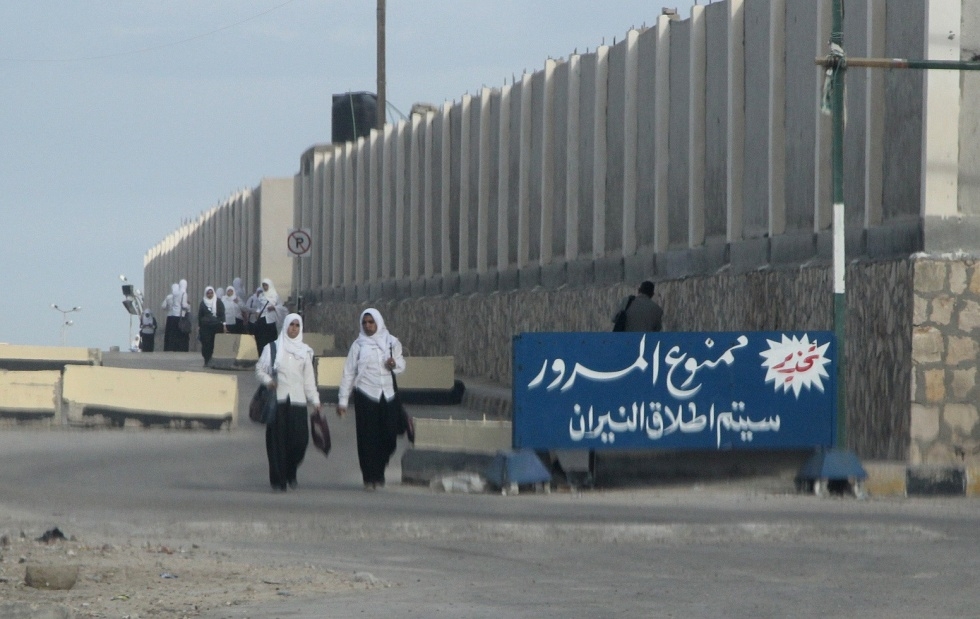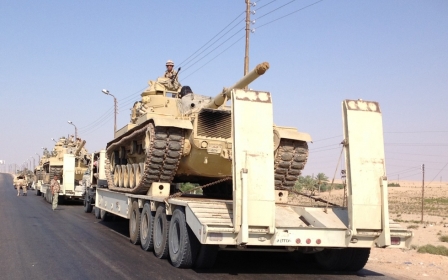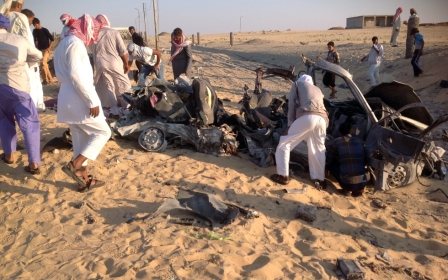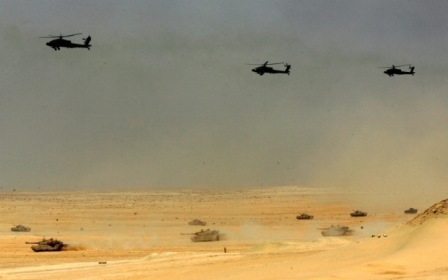13 killed in Egypt's Sinai as army, militants continue attacks

At least 11 civilians and two police officers were reportedly killed in three separate attacks in Egypt's Sinai Peninsula over the past twenty-four hours.
A mortar shell hit a house in a residential area south of Sheik Zuweid city on Wednesday, killing nine of its occupants, Egyptian officials told the Associated Press (AP).
Two other civilians were killed in a separate attack when a missile landed on house in another village, also in northern Sinai, according to the officials.
Meanwhile in a third attack, two police officers were killed outside the provincial capital al-Arish when an explosive detonated as a military vehicle passed by, the officials quoted by AP.
However, an Egyptian medical source told the Anadolu Agency (AA) that 11 people from the same family were killed when a mortar shell hit their house in Sheikh Zuweid city.
"All the victims are from the same family," which include women and children, the source told AA, adding that there were six people injured in the attack.
While the explosive is assumed to be planted by militants targeting military convoys in the area, the hitting of the two houses remains unclaimed officially.
Who is responsible for the attacks?
However, one source in al-Arish told MEE on condition of anonymity that the targeting of houses in residential areas is usually the work of the army, not the militants.
"The militants kill government informants directly, as can be seen in their brutal videos, but they're not known to target their families," the source told MEE.
"There were two cases a while back where militants destroyed two houses used by the police force [which did not house civilians] in al-Arish and Sheikh Zuweid city," said the source, adding that 99% of the time such shelling is carried out by the army.
According to the source, the civilians killed in Wednesday's attack were members of al-Hebaiby family in the village of al-Dhehair, 7-8 km south of Sheikh Zuweid city, but the precise death toll is yet unclear.
"I think because of the high death toll is this particular attack, there has been some media attention. But the fact is there are 2-3 people being killed on daily basis but without receiving much international attention," said the source.
"In most cases, the corpses would be taken to al-Arish hospital, where the next of kind must sign statements laying the blame of the deaths on 'unknown assailants' - exonerating the army – before they could take the bodies for burial," he added.
Army engaging in 'pre-emptive attacks'
The army appears to be unsure of how to deal with the militants, many of whom are locals of these areas.
"Because the army cannot distinguish between the militants and the general population, their (army) fire becomes more random, punishing everyone as a result," the source said.
"Also, because of fears of having their positions being attacked, the army engages in 'pre-emptive attacks' against villages as a way of deterrence," he added.
Such offensives often take place at night, disturbing the sleep of residents, and the firing usually comes from Israeli-made drones flying over the villages or Egyptian tanks stationed in military zones in the area, the source said.
Egypt's Sinai Peninsula is where the militant group formally known as Ansar Beit al-Maqdis is based. The group has changed its named last year to Sinai Province after reportedly pledging allegiance to the Islamic State (IS).
Continuing instability
Last week, Sinai Province claimed responsibly for a series of attacks that killed 15 soldiers and two civilians in the restive peninsula. In retaliation, the army has reportedly killed over a dozen militants.
The region has long been unstable and its residents complain of government neglect, high economic problems in comparison to other regions in the country, as well as what locals perceive as unfair security crackdown.
However, tensions have further escalated following the military ouster of elected President Mohammed Morsi on 3 July, 2013.
Since then, anti-government militancy has spread beyond Sinai, with bomb attacks reaching the capital Cairo.
The government has responded with demolishing houses on the border with the Gaza Strip and with more security operations, which observers say are counterproductive.
Middle East Eye propose une couverture et une analyse indépendantes et incomparables du Moyen-Orient, de l’Afrique du Nord et d’autres régions du monde. Pour en savoir plus sur la reprise de ce contenu et les frais qui s’appliquent, veuillez remplir ce formulaire [en anglais]. Pour en savoir plus sur MEE, cliquez ici [en anglais].




